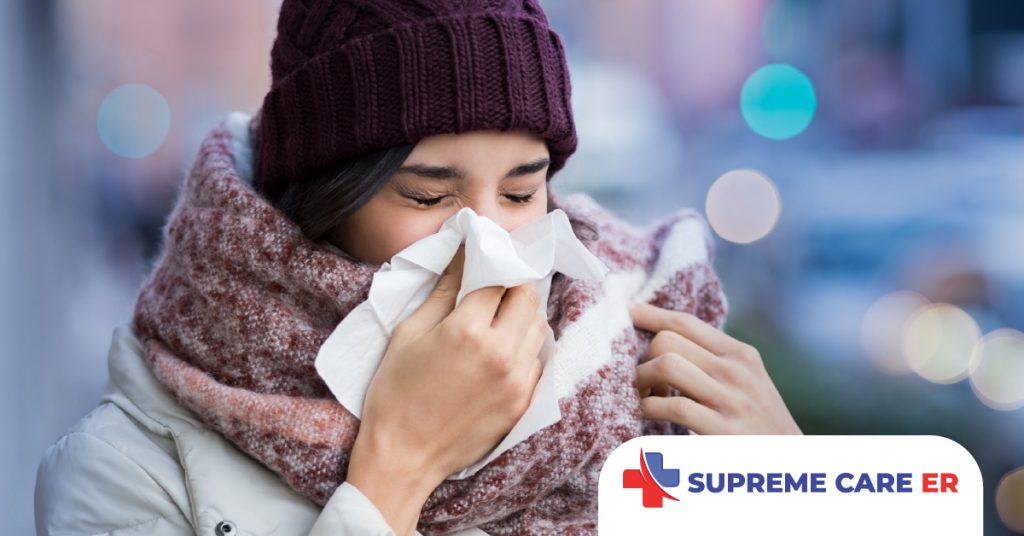Food poisoning and Stomach Flu often get confused as they are both related to gastrointestinal issues. However, there are differences between the two. If you come down with a food poisoning or stomach flu episode, it is vital to know the difference between these two conditions rather than treating them as the same thing.
What is Stomach Flu?
Stomach flu or gastroenteritis is an infection in the gastrointestinal tract. The main symptom of Stomach flu is usually diarrhea, nausea, and vomiting.
What is Food Poisoning?
Food poisoning is a condition that results when the body is affected by certain bacteria or toxins present in the food. These symptoms include nausea, abdominal cramping, vomiting, and diarrhea. The infection caused by the bacteria or toxins is known as a food-borne illness. Food poisoning usually occurs due to improper storage, poor handling, or reheating of the food.
What is the Difference: Stomach Flu vs. Food Poisoning
Causes of Stomach Flu
It can be triggered by many viruses and usually developed after consuming contaminated food or water or contacting infected people. In rare cases, stomach flu can result from bacteria.
Causes of Food Poisoning
Food contamination results from bacteria or toxic substances that enter the system. The infection can spread, via cross-contamination, if the contaminated food is not stored or cooked correctly.
Symptoms of Stomach Flu
The symptoms of stomach flu include:
- You usually have watery, colorless diarrhea – bloody diarrhea indicates a more severe infection.
- Abdominal pain and constipation.
- Nausea or vomiting.
- Muscle pain or headaches can occur from time to time.
- Fever of a mild nature.
Symptoms of Food Poisoning
The symptoms of food poisoning are:
- Stomach upset.
- Cramps in the stomach.
- Feeling nauseated.
- Diarrhea.
- Vomiting.
- Fever.
Treatment for Stomach Flu
Promethazine, prochlorperazine, metoclopramide, or ondansetron, which stop nausea and vomiting, are antiemetic medications commonly prescribed for stomach flu.
Alternatively, you can take an over-the-counter antidiarrhea medication, such as loperamide hydrochloride (Imodium) or bismuth subsalicylate (Pepto-Bismol).
In addition to this, drinking lots of fluids and eating soft foods are recommended to prevent a recurrence.
Treatment for Food Poisoning
It is usually a self-resolving condition and requires no specific treatment, although there are some situations when you should consult your doctor.
As you recover, make sure to rest and drink fluids to avoid dehydration. Even if you can only drink in bits, drink plenty of water.
Try light and small meals such as crackers, toast, bananas, and rice during your first few days. When you feel better, increase the quantity and variety of bland foods.
People with conditions such as the elderly or those with other health conditions might find it helpful to use oral rehydration solutions (ORS), available at pharmacies.
Prevention
Stomach Flu
- To prevent stomach flu:
- Use soap and water often to wash your hands.
- Combine hand sanitizer with hand washing.
- Avoid touching your face, nose, mouth, and eyes with unwashed or ungloved hands.
- Keep surfaces you touch regularly clean by frequently disinfecting them with a household cleaner.
- Vaccinate
Food Poisoning
To prevent food poisoning:
- Keep food at safe temperatures.
- Cook food thoroughly.
- Make sure to wash your hands before preparing and serving food.
- Keep raw foods separate from ready-to-eat foods (such as meat and poultry) by using different cutting boards, refrigerators, freezers, or storage containers.
When Should You See a Doctor?
Stomach Flu
- You are constantly vomiting, e.g., for more than two days
- The liquids you consume are not able to be held down for 24 hours.
- You are vomiting blood.
- You are dehydrated – symptoms of dehydration are severe weakness, excessive thirst, dry mouth, lightheadedness, deep yellow or no urine, dry mouth.
Food Poisoning
- You are continuously vomiting and cannot keep liquids down
- You have a high fever of over 102°F (38°C)
- You are severely dehydrated – symptoms of dehydration are severe weakness, excessive thirst, dry mouth, lightheadedness, deep yellow or no urine, dry mouth.
If you ever have any severe symptoms of stomach flu or food poisoning, don’t hesitate to visit supremecare24, where our attending doctors and committed nursing staff will help you get the treatment you need to get better.








